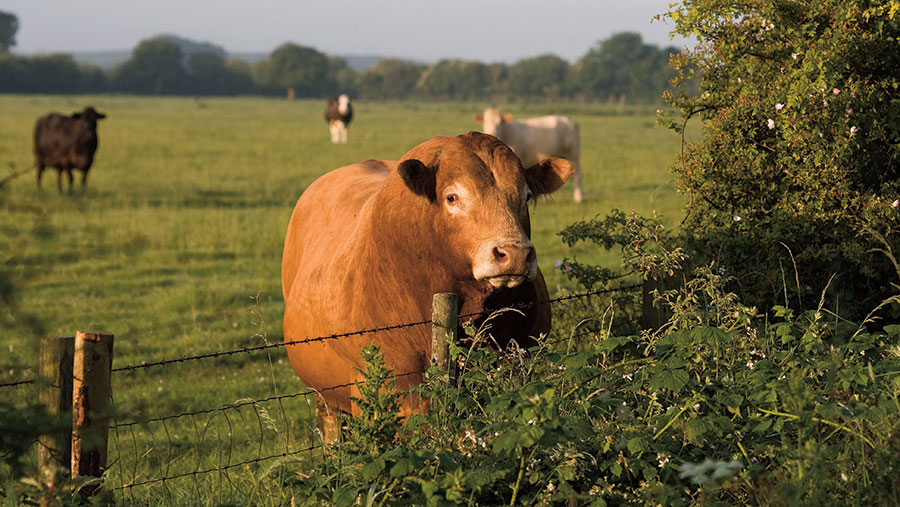Business Clinic: Can we get neighbours to stock-proof fences?
 © FLPA/REX/Shutterstock
© FLPA/REX/Shutterstock Whether you have a legal, tax, insurance, management or land issue, Farmers Weekly’s Business Clinic experts can help. Here, Mark Charter, partner at Thrings, advises on the tricky area of garden fences which adjoin livestock land.
Q We have a beef and sheep farm on the beautiful North Yorkshire coast. One of our fields is bordered by a row of bungalows built in the 1960s.
Each property’s garden borders one of our livestock fields and over the years all the properties have replaced the original fence with their own.
Some of their garden fences are now wholly inadequate as a livestock fence, but allow the property a superb view over our land to the coast beyond.
Where do we stand if our livestock gets into their gardens? Can we ask/force them to raise the standard of their garden fence?
A The title documents of your farm and the neighbouring bungalows may contain information as to whether you or the neighbouring bungalow owners are under a positive obligation (covenant) to fence, and if so whether the obligation imposes a requirement to fence to a particular standard or specification (and indeed maintain and repair a fence).
See also: Business Clinic: When a widow is not included in a will
 Mark Charter, partner, Thrings
Mark Charter, partner, ThringsIt could be worth you exploring what these documents provide initially.
Provided the respective titles to the bungalows are registered at the Land Registry, you will be able to obtain copies of your neighbours’ title deeds via the Land Registry.
If the bungalow owners are not subject to a covenant (in your favour) to fence to a particular standard you cannot oblige them to improve the standard of their garden fence.
Despite what the title documents might say, it is important to bear in mind that the ownership of livestock brings with it various legal responsibilities. Some of these responsibilities are set out in the Animals Act 1971.
Cattle and sheep are included in the definition of “livestock” in the 1971 Act and you could be liable for damage done by the livestock to land and any property of other people, including the owners of the bungalows.
To prove liability under the relevant section of the 1971 Act (section 2(2)), the keeper can be liable if the damage caused was likely to be caused by that animal unless it was restrained, that particular animal’s characteristics were exceptionally likely to cause damage and the keeper was aware of the characteristics.
That section of the Act is not the easiest to follow but, thankfully, its meaning was explored in the recent case of Williams v Hawkes [2017] EWCA Civ 1846.
In this case, a Charolais steer was killed having jumped a 6ft fence, run onto a dual carriageway and collided with a car. The car was badly damaged and its driver suffered significant injuries and brought a claim against the steer’s keeper for negligence and liability under the 1971 Act.
Section 8 of the 1971 Act provides for a duty to take reasonable care to see that damage is not caused by animals straying onto a highway.
Despite the fencing being, in the judge’s view, “entirely appropriate”, which ruled out the negligence claim, the keeper was held to be liable for the damage caused by the steer under section 2(2) of the 1971 Act.
The decision is a reminder that livestock keepers should ensure that they have adequate insurance against negligence and 1971 Act claims.
Section 4 of the 1971 Act further provides that where livestock stray onto the land in the ownership or occupation of someone, obviously other than the person to whom the livestock belong, the livestock owner is liable for damage to that other person’s land or property, and also for any expenses incurred by that person in keeping the livestock, until he or she can establish who the owner of the livestock is.
Subject to what the title documents might say in terms of fencing, it may (in any event) be worth discussing your position with the owners of the bungalows to see whether you could agree to share the cost of making the existing fencing stock-proof.
Do you have a question for the panel?
 Outline your legal, tax, finance, insurance or farm management question in no more than 350 words and Farmers Weekly will put it to a member of the panel. Please give as much information as possible.
Outline your legal, tax, finance, insurance or farm management question in no more than 350 words and Farmers Weekly will put it to a member of the panel. Please give as much information as possible.
Send your enquiry to Business Clinic, Farmers Weekly, RBI, Quadrant House, The Quadrant, Sutton, Surrey SM2 5AS.
You can also email your question to fwbusinessclinic@rbi.co.uk.
